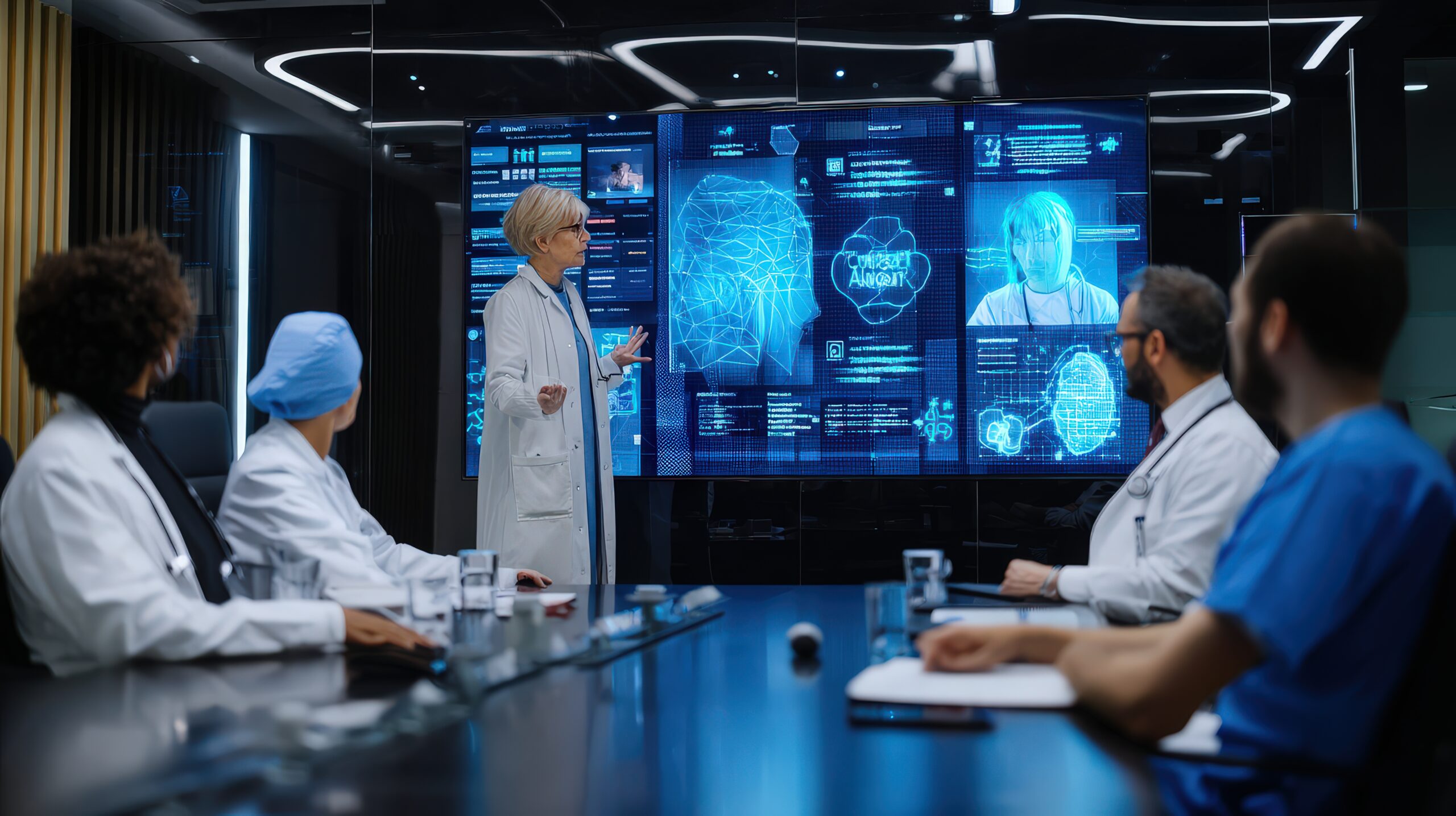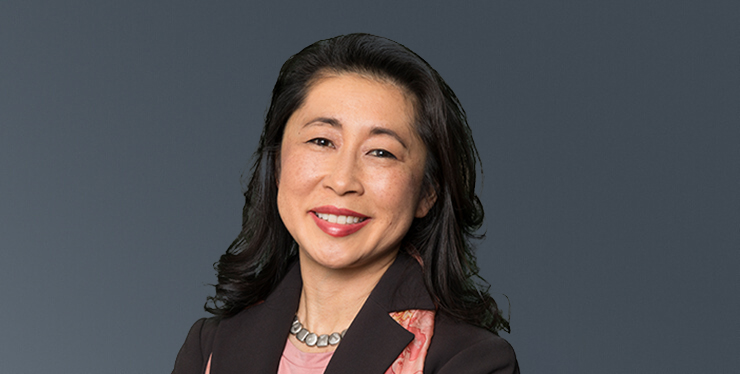
AI, culture and well-being: New Spotify CHRO unveils her top priorities
Spotify CHRO Anna Lundström drives AI readiness, culture, and personalized well-being to empower employees and sustain Spotify’s innovative, human-centric growth....

by Tomoko Yokoi, Michael R. Wade Published July 10, 2025 in Artificial Intelligence • 9 min read
Artificial intelligence has transcended its initial promise to become a fundamental strategic imperative in healthcare and pharmaceuticals. Organizations at the forefront of this transformation are building AI capabilities across multiple areas of operation, establishing market advantages through technological innovation and organizational transformation.
At IMD’s TONOMUS Global Center for Digital and AI Transformation, we’ve developed a comprehensive framework that evaluates organizations’ AI maturity across five key dimensions. Our proprietary AI Maturity Index provides valuable insights into what differentiates industry pioneers from those still catching up in these heavily regulated, complex sectors.
When examining the 2024 AI Maturity Ranking with a focus on healthcare and pharmaceutical organizations like Bayer (#20), Medtronic (#26), and AstraZeneca (#28), clear patterns emerge that offer a roadmap for organizations seeking to enhance their own AI capabilities.
At the most successful firms, leadership teams are strategically positioning AI as central to corporate strategy through significant investments.
The path toward AI maturity in healthcare begins with decisive boardroom action and executive commitment. At the most successful firms, leadership teams are strategically positioning AI as central to corporate strategy through significant investments, targeted appointments, and organizational restructuring.
Bayer exemplifies this approach through substantial financial investment directed from the highest levels of the organization. In 2022, the company announced a $1.4 billion investment in digital transformation, with Board of Management approval for AI and data science as cornerstone technologies. CEO Bill Anderson and the executive team have established a group-wide data strategy focused on quality, integration, analytics, and security – creating the foundation for responsible AI deployment across divisions.
Medtronic’s Chairman and CEO Geoff Martha has been instrumental in positioning the company as a global leader in healthcare technology with AI as a strategic differentiator. Martha has established an AI Center of Excellence to coordinate AI initiatives across the organization and works closely with regulatory agencies on AI implementation frameworks. The company’s leadership team, including Chief Technology and Innovation Officer Ken Washington, has articulated a vision where AI can transform global health systems while emphasizing appropriate guardrails.
AstraZeneca’s leadership has demonstrated commitment to AI through strategic executive appointments. In July 2023, CEO Pascal Soriot appointed Sharon Barr as Executive Vice President of BioPharmaceuticals R&D, bringing her extensive experience with AI and data science from her previous role at Alexion.

“Leading healthcare and pharmaceutical organizations have embedded AI into their operational processes and workflows, focusing on applications that improve efficiency, reduce costs, and enhance business performance.”
Healthcare organizations have established specialized technical infrastructures that drive innovations in their products, research capabilities, and therapeutic technologies.
AstraZeneca has built AI-powered knowledge graphs that integrate complex biological relationships across genes, proteins, diseases, and drugs. This specialized infrastructure enables the identification of disease mechanisms and drug targets that would remain hidden using conventional research methods. Their use of language models like ChatGPT and ClinicalBERT to analyze scientific literature and clinical data enables rapid repurposing of existing medicines. The company’s MILTON AI tool, announced in September 2024, represents a significant technological advancement, predicting over 1,000 diseases before diagnosis to enhance early intervention and personalized treatments.
One of Medtronic’s most significant AI advancements is the GI Genius™ module, an AI-assisted colonoscopy tool that uses NVIDIA’s Holoscan and IGX technologies. This platform supports multiple AI algorithms, allowing third-party developers to create and deploy applications that enhance diagnostic accuracy in gastroenterology procedures. Medtronic’s Live Stream technology with AI analysis for laparoscopic and robotic-assisted procedures, launched in April 2024, provides real-time surgical guidance, enhancing precision in complex interventions. Their AI-enhanced Reveal Linq cardiac monitors represent another key technological innovation that significantly improves arrhythmia detection accuracy.
Bayer has developed specialized computational platforms that simulate biological systems and predict therapeutic outcomes. In the Crop Science division, AI simulations allow Bayer to predict which genetics, seeds, or germplasm will perform best, reducing the need for in-field testing and representing a significant advancement in agricultural research methodology. In April 2024, the company partnered with Google Cloud to develop AI solutions for radiologists, demonstrating their focus on creating innovative healthcare diagnostic technologies.

The leading healthcare and pharmaceutical organizations have embedded AI into their operational processes and workflows, focusing on applications that improve efficiency, reduce costs, and enhance business performance.
AstraZeneca has transformed clinical trial design and operation through AI implementation. By applying machine learning to historical clinical data, they’ve created innovative trial methodologies with smaller control groups and more precise patient stratification, improving trial efficiency while reducing patient exposure to placebos. In manufacturing, they’ve established “digital lighthouse” sites in China and Sweden that optimize pharmaceutical production through AI. These facilities employ advanced analytics to maintain precise environmental conditions, ensure batch consistency, and prevent contamination – enhancing operational efficiency and quality control.
Medtronic has integrated AI into its operational processes to improve efficiency across the organization. Their AI Center of Excellence streamlines AI implementation across divisions, ensuring consistent approaches to data governance and model deployment. Through their India campus expansion with a $60M IT center, the company is creating operational hubs focused on AI implementation and scaling, allowing for more efficient deployment of AI solutions throughout the global organization.
Bayer has operationalized AI across multiple business functions, including safety issue identification, regulatory compliance, supply chain optimization, and distribution streamlining. These implementations deliver efficiency improvements while ensuring product quality and regulatory compliance.

Healthcare AI implementation requires unique workforce development focused on combining clinical expertise with technical capabilities.
Medtronic’s expansion of their India campus with a $60M IT center in July 2024 includes plans to hire 300 new employees focused on cutting-edge technologies, including AI/ML and digital health applications.
AstraZeneca has invested in developing multidisciplinary teams that combine medical expertise with data science capabilities, enhancing collaboration between specialist groups working on AI implementation across the company’s value chain.
Bayer’s 2022 digital transformation investment includes significant resources for developing AI capabilities within its workforce across both pharmaceutical and agricultural divisions, ensuring employees have the skills necessary to leverage AI technologies effectively.
Medtronic's October 2024 partnership with GI Alliance to implement GI Genius™ AI technology across 400 locations demonstrates how provider relationships accelerate clinical AI adoption.
Leaders in healthcare AI maturity extend their capabilities through specialized partnerships that accelerate development while addressing medicine’s unique collaborative research tradition.
Bayer demonstrates this ecosystem approach through targeted alliances with clinical research organizations and technology specialists. Their March 2024 partnership with Aignostics to develop an AI-powered platform for identifying cancer targets combines Bayer’s therapeutic expertise with Aignostics’ specialized AI capabilities. Bayer has also partnered with Salus Optima on AI-driven health solutions and with Google Cloud on drug discovery.
AstraZeneca extends its innovation ecosystem through academic and biotech partnerships. Their September 2024 collaboration with Immunai, including an $18 million investment, combines AstraZeneca’s clinical trial expertise with Immunai’s immune system modeling capabilities. In October 2024, their partnership with Owkin to create an AI tool for gBRCA prescreening in breast cancer patients addresses specific clinical challenges through combined expertise.
Medtronic’s October 2024 partnership with GI Alliance to implement GI Genius™ AI technology across 400 locations demonstrates how provider relationships accelerate clinical AI adoption and generate real-world evidence for continued improvement.

“Bayer has established comprehensive governance frameworks that emphasize minimizing bias, safeguarding privacy, and fostering transparency.”
Healthcare AI requires specialized governance frameworks that address unique considerations in patient safety, diagnostic liability, and therapeutic decision-making.
Medtronic’s AI Compass guides the ethical and effective application of AI technologies, emphasizing patient safety, fairness, transparency, and human oversight. This framework recognizes that healthcare AI must augment rather than replace clinical judgment.
AstraZeneca’s ethical frameworks address the sensitive implications of early disease prediction, including patient counseling and appropriate intervention pathways. Their governance approach explicitly addresses informed consent for AI-assisted diagnosis and establishes clear boundaries between algorithmic prediction and clinical decision-making.
Bayer has established comprehensive governance frameworks that emphasize minimizing bias, safeguarding privacy, and fostering transparency. Bayer’s approach balances innovation with ethical considerations, particularly in applications where AI decisions could impact patient care or food safety.
The healthcare and pharmaceutical organizations that will thrive in the coming decade will be those that systematically develop their AI capabilities across all of these dimensions.
The healthcare and pharmaceutical sectors demonstrate how systematic development of AI capabilities creates sustainable competitive advantages in improving patient outcomes, accelerating innovation cycles, and enhancing operational efficiency. Organizations that excel across the five dimensions of AI maturity consistently outperform peers in therapeutic innovation, regulatory compliance, and clinical value delivery.
For healthcare organizations seeking to enhance their own AI maturity, the examples set by industry leaders offer valuable guidance:
The healthcare and pharmaceutical organizations that will thrive in the coming decade will be those that systematically develop their AI capabilities across all of these dimensions. As the AI Maturity Index demonstrates, this comprehensive approach creates resilient organizations capable of delivering transformative patient outcomes while navigating the complex regulatory landscape of modern healthcare.
IMD’s TONOMUS Global Center for Digital and AI Transformation provides proprietary analysis and executive education focused on helping organizations enhance their digital and AI maturity. If you are interested in the AI Maturity Index methodology or would like to assess your organization’s current capabilities, you’ll find more information here.
All views expressed herein are those of the author and have been specifically developed and published in accordance with the principles of academic freedom. As such, such views are not necessarily held or endorsed by TONOMUS or its affiliates.

Researcher
Tomoko Yokoi is a researcher and senior business executive with expertise in digital business transformations, women in tech, and digital innovation. With 20 years of experience in B2B and B2C industries, her insights are regularly published in outlets such as Forbes and MIT Sloan Management Review.

Professor of Strategy and Digital
Michael R Wade is Professor of Strategy and Digital at IMD and Director of the Global Center for Digital and AI Transformation. He directs a number of open programs such as Leading Digital and AI Transformation, Digital Transformation for Boards, Leading Digital Execution, Digital Transformation Sprint, Digital Transformation in Practice, Business Creativity and Innovation Sprint. He has written 10 books, hundreds of articles, and hosted popular management podcasts including Mike & Amit Talk Tech. In 2021, he was inducted into the Swiss Digital Shapers Hall of Fame.

February 25, 2026 in Artificial Intelligence
Spotify CHRO Anna Lundström drives AI readiness, culture, and personalized well-being to empower employees and sustain Spotify’s innovative, human-centric growth....

February 18, 2026 • by Faisal Hoque, Paul Scade in Artificial Intelligence
Transform your AI adoption strategy from a high-stakes gamble into a portfolio of calculated moves using this plan, write Faisal Hoque and Paul Scade....

February 18, 2026 • by Michael Yaziji in Artificial Intelligence
Organizations should let departments choose the right balance between humans and AI, and focus on outcomes, not rigid processes, to keep pace with rapid technological change. ...

February 17, 2026 • by Julia Binder in Artificial Intelligence
CSOs should harness artificial intelligence to embed sustainability at the center of strategy and growth. We explore how the most successful companies are already doing this. ...
Explore first person business intelligence from top minds curated for a global executive audience